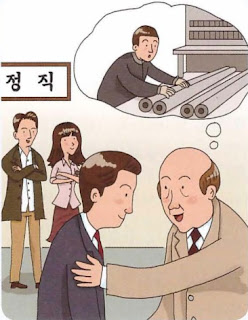을망정/ ㄹ망정 is used when hypothesizing the content in the preceding clause. It indicates the subject’s strong will to choose the situation in the preceding clause if he or she had to choose between two situations, one in the preceding clause and one in the following clause. In many cases, negative or extreme situations are stated in the preceding clause to emphasize the following clause or to clarify the subject’s intention.
가: 우리 사장님은 집안이 어려워서 중학교도 졸업을 못 하셨다면서요?
Is it true that our company president had a tough childhood and didn’t even graduate from middle school?
나: 네, 학교는 제대로 못 다녔을망정 자기 분야에서는 최고가 되어야겠다고 결심을 하고 피나는 노력을 하셨다고 하더 라고요.
Yes, they say that although he didn’t properly finish school, he decided to become the best in his line of work and then put all of his energy into strenuous efforts to do so.
가: 정말 대단하시네요. 게다가 성공을 하려면 정직하기가 쉽지 않은데 우리 사장님은 정말 정직하게 사업을 하시잖아요.
That’s really impressive. And what’s more, even though it isn’t easy to be honest to succeed in business, our president has done everything very honestly.
나: 손해를 볼망정 부정한 방법으로는 돈을 벌지 않겠다는 게 사장님의 신조잖아요. 그런 신조가 많은 사람들에게 믿음을 주고 회사를 이렇게 크게 키울 수 있었던 것 같아요.
He would rather take a business loss than make money through improper means. I think that belief has gained him the trust of many people and has allowed him to build the company up to its current big size.

• 동생은 길에서 얼어 죽을망정 집에는 절대로 들어가지 않겠다고 버티고 있다.
My brother defiantly said he would rather freeze out on the side of the road than ever go home.
• 김 교수님은 강의하다 쓰러질망정 병원에서 남은 생을 보내고 싶지 않다고 하셨다.
Professor Kim would rather fail over dead while giving a lecture than spend the rest of his days in a hospital.
This expression acknowledges some fact in the preceding clause but then introduces a contradictory or opposing fact in the following clause.
• 그 영화는 흥행에 성공하지는 못했을망정 예술적 인 가치는 높이 평가됐다.
While that movie didn’t succeed at the box office, it has been highly praised for its artistic value
.
• 그들이 민주화를 이루어 가는 방식은 서로 다를망정 나라를 사랑하는 마음은 다 같다.
While they have mutually different ways of achieving democratic change, their love of the country is the same.
1. This expression is also often used in the forms -지는 못할망정 and 은/는 못할망정 but in such cases, it indicates that while an everyday situation was expected, in reality, that was not the case, and that something shocking happened.
• 그 사람은 자기가 잘못해 놓고 사과하지는 못할망정 오히 려 화를 냈다.
Rather than apologize for his mistake, he (shockingly) became angry.
• 경기를 앞둔 선수들에게 격려는 못할망정 욕을 해 대는 사람들도 있었다.
Rather than encourage the players right before the game, there were (even) people who cursed at them.
2. This expression can be replaced with -(으)ㄹ지언정 without a major change in meaning, but -(으)ㄹ지언정 has a slightly stronger nuance than -(으)ㄹ망정.
• 동생은 길에서 얼어 죽을지언정 집에는 절대로 들어가지 않겠다고 버티고 있다.
• 그 영화는 흥행에 성공하지는 못했을지언정 예술적인 가치는 높이 평가됐다.
>> You can click on the title of each grammar below to see other grammar which also expresses ‘Hypothetical Situations’
1. -더라도
2. -(으)ㄹ지라도
3. -(으)ㄴ들
4. -(으)ㄹ망정
5. -(느)ㄴ다고 치다
6. -는 셈치다
>> Full of ‘Korean grammar in use – Intermediate’: Click here

